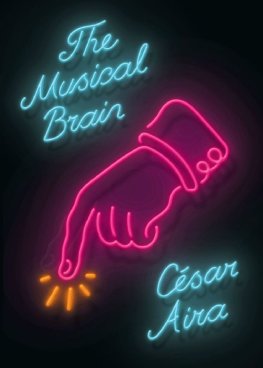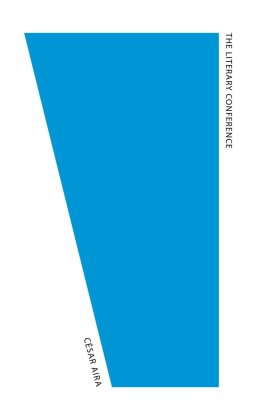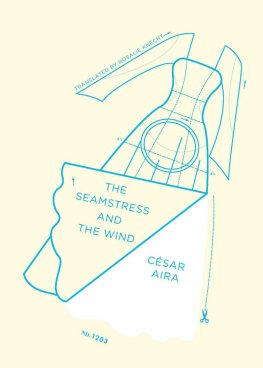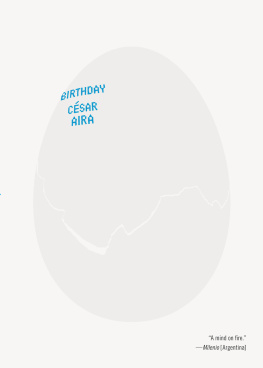ONE DAY IN 1923, in the city of Coln (Panama), a third-class clerk, having finished work, and, since it was payday, passed by the cashiers desk to collect his monthly salary, left the Ministry in which he was employed. In the interval between that moment and the dawn of the following day, ten or twelve hours later, he completed the composition of a long poem, from the initial decision to write it up to the final period, after which there were no further additions or corrections. The self-contained nature of the interval emerges more clearly still if we take into account the fact that never, in all his fifty years, had he written or felt any inclination to write a single line of poetry, and nor would he ever again. It was a bubble in time, in his biography, an exception without precedent or sequel. The action contained the inspiration, and vice versa, each nourishing and consuming the other, so that nothing was left over. Even so, this episode would have remained private and secret had its protagonist not been Varamo, had it not produced that celebrated masterpiece of modern Central American poetry, The Song of the Virgin Child.
This enigmatic poem (published in book form just a few days later, thus consolidating its status as a legendary bolt from the blue), origin and apogee of the most daring and experimental avant-garde movement in the language, has been repeatedly described as an inexplicable miracle because of the insurmountable contextual problems it poses for critics and literary historians.
But there is an explanation for everything in the world. To find the explanation in this case, we must remember that just as the episode had an end (the poem itself), so it had a beginning, and the two points correspond symmetrically, as an effect corresponds to its cause, or vice versa. The cause, as suggested already, intervened when Varamo, having finished his days work, went to the cashiers desk to collect his salary. And what made this a beginning, the beginning of something that had, as yet, no form or name, was that on this occasion he was paid with counterfeit money. (The sum of two hundred pesos was given to him in two one-hundred peso bills.)
The aim of this narrative is to lay out the events as they unfolded, one after another, in a causal sequence, from the moment at which he picked up the bills to the completion of the poem. Both extremities of the sequence were equally foreign to the usual run of his thoughts. He had never handled, or seen, a counterfeit bill. He was quite capable of imagining the forgery of money, but nothing in his personal experience or that of his associates had ever led him to consider it as a real possibility. Similarly, he had never written, or read, or given any thought to poetry, or any other literary genre, for that matter. But one thing happened and it led on to the other; and the two were linked by a perfectly reasonable chain of causes and effects. There was, however, no reason for the beginning, or the end: their radical arbitrariness sealed off the sequence of events and set it apart, reinforcing its internal causal links with a cast-iron logic. Furthermore, the disparate nature of the two extremities (what relation could there be between a pair of counterfeit bills and a literary masterpiece?) led to an uncontrollable proliferation of intermediate steps. So the sequence was dense with meaning, but threatened from within by the infinite.
Varamo left the Ministry consumed by anxiety. He had realized that the bills were counterfeits even as the teller was handing them over with mechanical movements that he had repeated thousands of times. But he hadnt known how to react and was still in the grip of that quandary. What should he do with this money, which represented the sum total of his purchasing power for the duration of a month? His bureaucratic mentality had prevented him from responding promptly, before he touched the bills, and now that he had put them in his pocket it was too late. He had felt that their illegal status called implicitly for silence and discretion. Like nearly all public servants, he didnt do anything special to earn his salary, so he thought of it as a kind of gift, and all his instincts had told him to take the money, to keep his head down and his mouth shut. In any case it was a miserable amount, a mere pittance doled out by the state to those privileged, middle-class citizens who were incapable of productive work. But now, of course, he could end up under a different rubric of the national budget: if he were caught using counterfeit money, hed be thrown into prison. He had literally no idea what to do, and he could barely walk; the few hundred yards to his house seemed like a journey all the way around the world. What could he do? What could he do? He couldnt even imagine possibilities. The situation was too unfamiliar. Up until then counterfeit bills had been unheard-of in Panama. And new bills were released very gradually into the countrys slow-moving economy. But if this predicament really was entirely new, how could he have grasped it immediately, with all its ramifications? There was only one explanation: this was the reactivation of an archetypal situation, deeply imprinted in the brain, even the brain of a man as inexperienced as this pen pusher. Which also explained why it was so overwhelming, because it gave him cause to wonder: Of all the people in the world, why me?
His paralysis notwithstanding he had kept moving and was now in the street. The Palace of the Ministries, from which he had emerged, faced onto the citys central square. The last rays of sun lit up the plumes of the palm trees, in whose mercifully cool shade a busy crowd was milling. Waves of office workers were leaving the government buildings around the square and crossing it in all directions; there were couples meeting, noisy schoolboys and girls hanging around, old people taking the air, children hurrying to finish their games before they had to go home. He too had to cross the square, but first he had to cross the street, which he did with care: it was the moment when the drivers of the senior public servants started up their cars and engaged in all kinds of maneuvers to secure the most convenient positions for their bosses. The din they made was deafening, but there was also the multitudinous buzz of hundreds of voices and cries, and the chorus of the birds in the trees making their usual evening racket. Suddenly, a high, sustained note was added to all that noise; Varamo scarcely needed to register the sound to know what it was. It made him look up and across the square to the long central avenue, where he could see that that ceremony of lowering the flag had indeed begun. Opposite the Palace of the Ministries, on the other side of the square, was the Ministry of the Interior, and every afternoon at exactly five oclock a squad of cadets issued from its gates and proceeded to lower the flag that they had hoisted at the break of day, in an identical but inverted ceremony. The slow ascent or descent was accompanied by the sustained bugle note that was now setting the tone for the general cacophony. That high-pitched single note felt very intimate and close, detached from the soldiers who, seen from a distance, looked like miniatures because of their garishly colored uniforms, the inhuman, metallic rigidity of their postures as they stood at attention, and the impeccable formality of their grooming not a hair out of place in striking contrast to the tropical exuberance of everything around them.
As Varamo crossed the street, carefully watching the cars, which were moving very slowly but in all directions, one of them reversed, then lurched forward and even seemed to move sideways around him, almost as if it were trying to block his way. It was one of the Hispano-Suizas imported many years before by the French, a vast black machine, eight yards long, sputtering and honking and apparently out to get him. Because of the nervous strain he was under he started in fright, as if a strange mechanical monster had chosen him for its prey. But as he was making up his mind to go around it and do whatever was necessary to reach the safety of the sidewalk (he was about to break into a run), he noticed that the driver, whose window he was facing, was calling out. He froze. The driver was addressing him, and must have been trying to approach him before; that was why the car had been making those strange movements, which Varamo had rendered even more bizarre by attempting to continue on his way. He greeted the man with a nervous smile, and as soon as he recognized him was assailed by a range of new fears. The drivers who worked for the Ministries formed a sort of brotherhood: they took bets on the last two or three numbers of the lottery, and offered credit to office workers like him. When it came to his gambling debts Varamo suffered from serious amnesia, so there was always a chance that he would be reminded of one at the most unexpected moment. It was a likely enough scenario, because the drivers would have known that it was payday and that he was bound to have cash in his pocket. Except that the cash. . But no: when he finally understood what the driver was saying, he realized that it was the other way around. The fellow had winnings to deliver, not Varamos, but his mothers. She was an inveterate gambler and when she came downtown, as she did every day, to shop or chat with her friends, she never missed an opportunity to play the numbers that she had dreamed up or worked out. This time she had won something, and the driver wanted to entrust the prize to her son. It was somewhat irregular to use an intermediary, but the irregularity of the whole operation meant that every so often it was suddenly imperative to pay all the debts and recoup all the loans, to wipe the slate clean and start over. Too relieved to protest, Varamo stretched out his hand and took what the entrepreneurial driver was offering him.
















